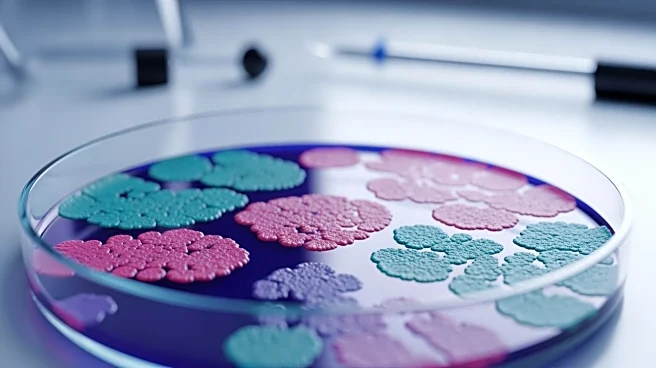What's Happening?
Recent research has delved into the mechanisms by which substrate utilization and cross-feeding within microbiomes contribute to resistance against pathogen invasion. The study highlights the importance
of microbial diversity and interactions in maintaining health and preventing disease. By examining various microbiome structures, researchers have identified that high diversity within these communities can limit the prevalence of pathogens. This is achieved through nutrient blocking and competitive interactions that prevent harmful bacteria from establishing themselves. The findings underscore the complex interplay between different microbial species and their collective impact on health, suggesting potential applications in enhancing disease resistance through microbiome management.
Why It's Important?
Understanding the role of microbiomes in pathogen resistance is crucial for developing new strategies to combat infectious diseases. This research could lead to innovative approaches in agriculture, where enhancing plant microbiomes might reduce the need for chemical pesticides. In human health, manipulating gut microbiomes could offer new treatments for preventing infections and managing chronic diseases. The study's insights into microbial interactions also have implications for biotechnology, where engineered microbiomes could be used to improve health outcomes. As antibiotic resistance becomes a growing concern, these findings offer a promising avenue for alternative solutions.
What's Next?
Future research will likely focus on applying these findings to practical scenarios, such as developing microbiome-based therapies for disease prevention. Scientists may explore how specific microbial interactions can be harnessed to enhance resistance in crops and humans. Additionally, there could be increased interest in creating synthetic microbiomes tailored to specific health needs. Collaboration between microbiologists, healthcare professionals, and agricultural experts will be essential to translate these insights into real-world applications. Regulatory frameworks may also need to evolve to accommodate new microbiome-based products and treatments.
Beyond the Headlines
The ethical implications of manipulating microbiomes are significant, as altering these communities could have unforeseen consequences on ecosystems and human health. There is a need for careful consideration of the long-term impacts of microbiome interventions. Additionally, cultural perceptions of microbiome manipulation may vary, influencing public acceptance and policy development. As research progresses, it will be important to balance innovation with caution, ensuring that microbiome technologies are safe and beneficial for society.









